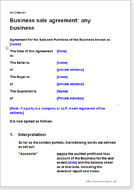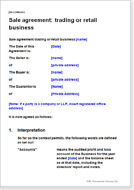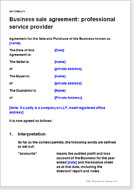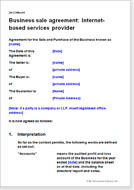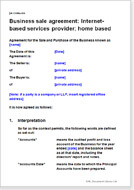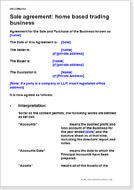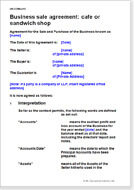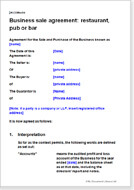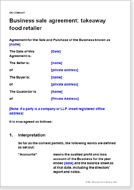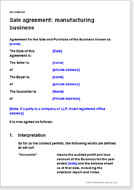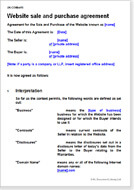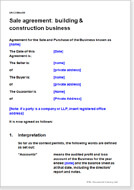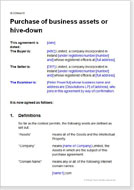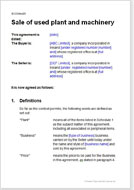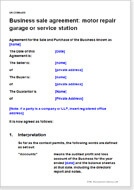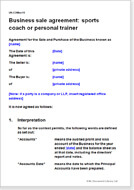These business sale agreements are intended to give protection to the buyer of a business. But if you are the seller, you will have a great advantage if you buy one of these documents, pull out its sharp teeth and offer it to your buyer. These agreements include a very large menu of warranties so that you can get the answers to even your most searching questions. Each agreement is very fully explained, particularly the concept of warranties. If you are buying the shares in a company and not the business, you will need one of our company sale agreements.
Business sale agreement: any business
Business sale agreement; modern, full version; inc transfer of leasehold or freehold property; with stock, e-commerce facility, menu of 120 warranties; suitable almost any type of business.
Sale agreement: trading or retail business
Full version business purchase agreement template for a wholesale or retail business, many options Inc e-commerce and contracts for freehold or leasehold property.
Business sale agreement: professional service provider
Use this comprehensive agreement to buy any business providing professional or personal services: business up to any size, with leasehold premises in any location. Large menu of warranties.
Business sale agreement: Internet-based services provider
Use this comprehensive agreement to buy an Internet service provider business of any sort, with freehold or leasehold premises in any location. Large menu of warranties
Business sale agreement: Internet-based services provider; home based
Use this comprehensive agreement to buy a B2B or B2C Internet service business, with no premises / work from home. Large menu of warranties!
Sale agreement: home based trading business
Use this comprehensive agreement to buy a home based Internet trading business selling goods of any description: no unnecessary verbiage, menu of suitable warranties.
Business sale agreement: cafe or sandwich shop
Cafe or sandwich shop business sale and purchase agreement: full version suitable for business of any value, provision for leasehold property transfer and many other features.
Business sale agreement: restaurant; pub or bar
Restaurant, pub or entertainment sale and purchase agt document a modern and full version with warranty menu of 120 items, includes leasehold transfer and freehold agreement for sale.
Business sale agreement: takeaway food retailer
Hot food takeaway business purchase agreement: comprehensive document covering stock, transfer of lease, website, full warranties, single or multiple outlets.
Sale agreement: manufacturing business
Purchase agreement for any manufacturing business. Includes for leasehold or freehold property transfer, staff and e-commerce.
Website sale and purchase agreement
Use this comprehensive agreement to buy a website, complete, but not yet trading. Large menu of warranties
Sale agreement: building & construction business
Business purchase agreement for property industry sales and service business, many options including transfer of freehold or leasehold property.
Purchase of business assets or hive-down
The essence of this agreement is that seller gives no warranties so the buyer has little protection. What he sees is what he gets. The reason for the sale is not relevant.
The document is not the sale of a business as a going concern but of assets in a "break-up" situation.
For example, it might be used to sell:
- plant and equipment
- intellectual property such as a customer list or copyright
- stock
Examples of use might be:
- for a “hive-down” or any other sale by a liquidator or examiner or trustee in bankruptcy
- a private sale where the seller will not give any warranty
- to record an inter-company transfer within a group of companies - to distribute profit where you want it to arise or where a subsidiary is merging with its holding company.
- where a business owner is closing a business
Sale of used plant and machinery
Use this agreement to buy or sell second hand plant, machinery or equipment.
This is for a one-off sale where seller is off-loading surplus assets and will give only limited warranties. It deals largely with making sure buyer obtains good tile and proper arrangements are made for payment and transfer of the plant to the buyer.
The document includes:
- limited warranties as to merchantability and product quality but full transfer of title
- provision for payment options, including by letter of credit
- provision for delivery, transportation, including abroad
- retention of title for incomplete payment
- a list of accompanying documents, supporting software and other associated parts
Business sale agreement: motor repair garage or service station
Purchase agreement for business of car / motor vehicle / plant / engineering, service, repairs. Includes for property and staff to be transferred.
Business sale agreement: sports coach or personal trainer
Use this comprehensive agreement to buy a home based personal service business providing non-Internet services: example: sports coach or physiotherapist. Menu of suitable warranties

If the document isn’t right for your circumstances for any reason, just tell us and we’ll refund you in full immediately.

We avoid legal terminology unless necessary. Plain English makes our documents easy to understand, easy to edit and more likely to be accepted.

You don’t need legal knowledge to use our documents. We explain what to edit and how in the guidance notes included at the end of the document.

Email us with questions about editing your document. Use our Lawyer Assist service if you’d like our legal team to check your document will do as you intend.

Our documents comply with the latest relevant law. Our lawyers regularly review how new law affects each document in our library.
What is a business purchase agreement?
Use a business sale agreement to 'business to transfer part of, or an entire business to another. The acquirer may be an individual, a partnership or a company. The business may be any of a range of industries and sectors.
Usually, it is the assets that are sold and the liabilities retained by the seller. Assets may include land and buildings, plant and machinery, equipment, stock, work in progress, and intellectual property ('IP') such as a website or customer database. In other words, any part of an operational business.
Suitable for use by both the buyer and the seller
Usually, it is the acquirer who proposes the terms of the contract. The reason is that they have the greater need for legal protection because they know less about the business than the seller.
However, there is nothing to stop the vendor from proposing initial terms.
Our business sale agreement template protects both sides. By including a greater number of warranties, the contract can be made to favour the acquirer.
To use this business purchase agreement, edit with the exact terms you agree, have both sides sign it (no witness necessary), and date it to make it legally binding. There is no requirement to take legal advice or any other sort, although you may wish to do so if there is much at stake.
Much needs to happen before you reach completion The buyer is likely to want to know everything and the seller still wants to avoid reducing his price.
Provisions within these business sale agreements
The following provisions are common to most of these business sale agreements, but sometimes the ways they are applied are different for each. In other words, the exact terms may be different.
As an example, every buyer will want to prevent his seller from setting up in competition, but how we make that happen is not the same for every transaction.
Identity of the subject of the sale
The business name may not be enough if it is merged into another organisation. Identifying exactly what is being transferred is important for future reference.
Similarly, excluded assets may be important to note.
The parties
The parties could be companies or one or more individuals.
We would suggest that the buyer should insist on a guarantor. This is particularly important when the vendor is a company that might cease to exist the day after the closing date of the deal.
Creditors and liabilities
The buyer buys the assets in the business. Debts remain due to be paid off by the seller (most likely from the proceeds). The buyer does not take them on. However, we provide for the seller to agree to pay them off promptly so that suppliers do not hesitate to supply the new owner.
Price apportionment within the payment terms
The price payable is probably the thing most on the mind of both parties.
However, it is not just a question of a lump sum payment, whether for cash or shares in acquirer.
How it is apportioned between goods, goodwill, fixed assets, and IP may also be important for both the seller and the buyer for efficient tax planning.
Timing of payment is not apportioned.
Cover all the angles at completion
In the excitement of the completion, it is very easy even for professionals to forget something.
Every contract provides a list of documents and other things to be exchanged at completion.
Competition by the seller and confidentiality about the deal
There are restraints against future direct competition by the seller in tough terms, cover for confidentiality of the terms of the deal itself and many other matters.
We believe our careful words will minimise the freedom of a seller to compete after the sale. If you are a seller, of course, you will want to edit these accordingly.
Transfer of IP
We have assumed that every business will use its website in ways we would expect. For example, a repair garage might not have a website at all, but if it does, it will not use its website for e-commerce.
There may be other IP that needs to be registered at transfer, such as trade marks.
So much depends on warranties
The basic structure on any business purchase or business sale agreement is based on Warranties. Warranties are promises made by the seller to the buyer. Over the years they have evolved into a system whereby each warranty stays in the same exact form as the buyer wants and is not edited. Instead, if the seller cannot make the promise, he qualifies its terms as part of a disclosure letter.
The warranties we provide in our business sale agreement give generous cover to the buyer. You will probably want to delete a few, but they are drawn to be appropriate for the particular type of transaction to which that document relates.
We have taken great care to draw the warranties in simple language so that both sides are absolutely clear about what is being warranted. We have included a large choice because it is easier for you to remove what you don't need than to word new warranties yourself.
Some of these include up to 100 warranties covering a wide range of affairs, from tax and accounts to contracts, the real properties, employees, IP, information technology and more.
Timing of the deal
The real-life experience of our legal team is that it is more efficient by far, to complete the deal on the day the contract is signed than to sign it for completion and payment at a future date. The main problem with future completion is that an awful lot can change in the course of a few days.
The downside of same day completion is that transfers of some property simply cannot be arranged as the bank draft is handed over. This applies most obviously to transfers or real property, leases, domain names and sometimes licensed IP. In these agreements, we have covered these points as far as possible, but much of it is down to you to arrange for everything to come together when the cash is handed over and the agreement dated.
What property will be handed over at completion
The buyer will need to know what he or she will take ownership of when the purchase price is transferred.
The list includes software, hardware, customer information, stocks of goods, special information letters to suppliers and customers - and anything special to your business that you need to add.
Real property
Most businesses trade from a location. We have provided for the possibility of the seller also selling the commercial property used by the business. Where specified, the agreement is also an enforceable contract for sale of the property.
In other cases, a business will lease its property. We have provided for that too in a transfer of the leasehold interest. So, unless we note otherwise, each document covers the commitment to complete the property transfer (when you will need a conveyancer) as well as a sale of the business.
Extensive notes to help you
Most people do not buy or sell businesses often. Even if you have done so before, it may not have been for some time.
Our guidance notes are particularly detailed, running in most cases to half the length of the contract and warranties combined.
Buying or selling less than the whole business
We have included in this section three other templates of purchase of business agreement for slightly different circumstances.
Transfer into a company structure
When your business reaches a certain size, you may wish to transfer it into a corporate structure in order to benefit from the limited liability that this business structure offer.
If so, you would likely transfer all of the assets to that new vehicle, unless there is an advantage (such as one for tax) in keeping back some to sell at a later date, to license or lease.
You sign this business purchase agreement twice - once for yourself as seller and once as director or partner of your acquiring company. You do not need a witness for this sort of business purchase agreement, but it may be a good idea to have one so that the date of the agreement cannot later be challenged.
You should record the terms of the transfer in the business purchase agreement so as to satisfy the requirements of:
- your new company in respect of the Companies Act 2014 to keep minutes of the meeting authorising such an important transaction
- Revenue Commissioners for calculating tax liabilities and for transferring value added tax obligations
- your bank, particularly if you are a borrower
- you, so that you have records of who owns valuable assets including IP
Purchase of assets only (including hive-down)
This business purchase agreement is for buying or selling assets, rather than the whole business as a going concern.
You could be selling or buying plant, equipment, a customer list, vehicles, stock, work in progress, software, insurance re-claimed goods, fire-damaged goods, or any other asset.
The only thing that you should not use this business purchase agreement to buy or sell is real property (land and buildings).
The key point about this business purchase agreement is that the seller gives no warranties.
Particularly we envisage that it might be used for a hive-down or any other sale by a liquidator or administrator or trustee in bankruptcy.
Purchase of used plant or physical assets
This business purchase agreement is for a straight purchase of business assets. The transaction is not a sale of business. It could cover any goods at all, but drawn particularly for bulk deals. It can be used where the counter-party may be any person or organisation in any country.
Whatever the asset or parties, this business purchase agreement provides the protection to both sides with a set of fair terms.
All rights reserved

